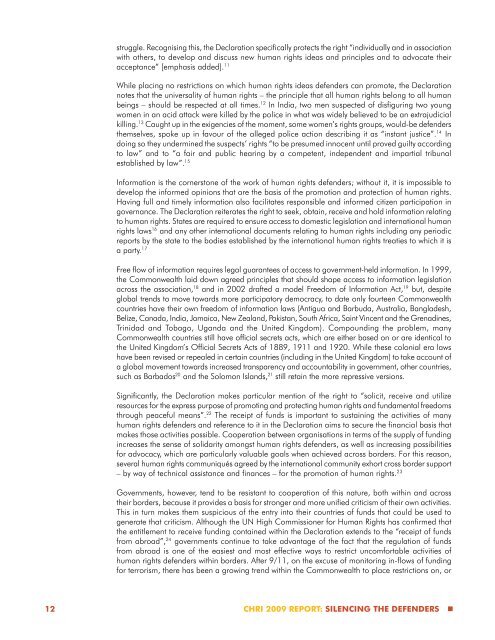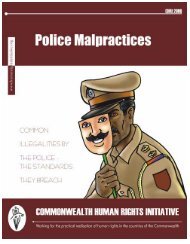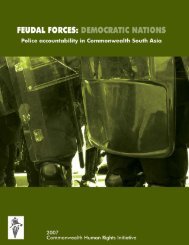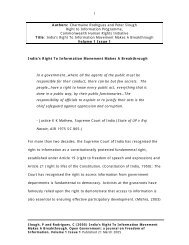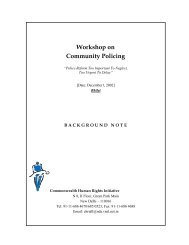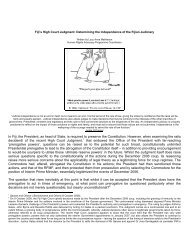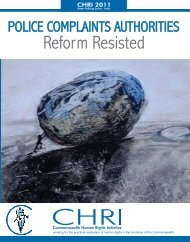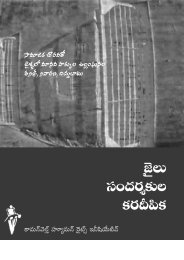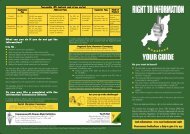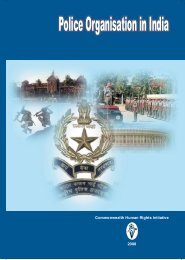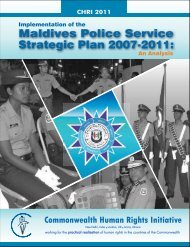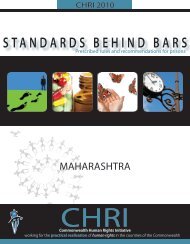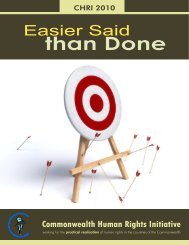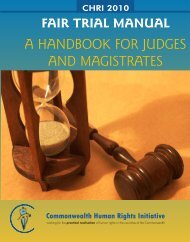Silencing the Defenders - Commonwealth Human Rights Initiative
Silencing the Defenders - Commonwealth Human Rights Initiative
Silencing the Defenders - Commonwealth Human Rights Initiative
Create successful ePaper yourself
Turn your PDF publications into a flip-book with our unique Google optimized e-Paper software.
struggle. Recognising this, <strong>the</strong> Declaration specifically protects <strong>the</strong> right “individually and in association<br />
with o<strong>the</strong>rs, to develop and discuss new human rights ideas and principles and to advocate <strong>the</strong>ir<br />
acceptance” [emphasis added]. 11<br />
While placing no restrictions on which human rights ideas defenders can promote, <strong>the</strong> Declaration<br />
notes that <strong>the</strong> universality of human rights – <strong>the</strong> principle that all human rights belong to all human<br />
beings – should be respected at all times. 12 In India, two men suspected of disfiguring two young<br />
women in an acid attack were killed by <strong>the</strong> police in what was widely believed to be an extrajudicial<br />
killing. 13 Caught up in <strong>the</strong> exigencies of <strong>the</strong> moment, some women’s rights groups, would-be defenders<br />
<strong>the</strong>mselves, spoke up in favour of <strong>the</strong> alleged police action describing it as “instant justice”. 14 In<br />
doing so <strong>the</strong>y undermined <strong>the</strong> suspects’ rights “to be presumed innocent until proved guilty according<br />
to law” and to “a fair and public hearing by a competent, independent and impartial tribunal<br />
established by law”. 15<br />
Information is <strong>the</strong> cornerstone of <strong>the</strong> work of human rights defenders; without it, it is impossible to<br />
develop <strong>the</strong> informed opinions that are <strong>the</strong> basis of <strong>the</strong> promotion and protection of human rights.<br />
Having full and timely information also facilitates responsible and informed citizen participation in<br />
governance. The Declaration reiterates <strong>the</strong> right to seek, obtain, receive and hold information relating<br />
to human rights. States are required to ensure access to domestic legislation and international human<br />
rights laws 16 and any o<strong>the</strong>r international documents relating to human rights including any periodic<br />
reports by <strong>the</strong> state to <strong>the</strong> bodies established by <strong>the</strong> international human rights treaties to which it is<br />
a party. 17<br />
Free flow of information requires legal guarantees of access to government-held information. In 1999,<br />
<strong>the</strong> <strong>Commonwealth</strong> laid down agreed principles that should shape access to information legislation<br />
across <strong>the</strong> association, 18 and in 2002 drafted a model Freedom of Information Act, 19 but, despite<br />
global trends to move towards more participatory democracy, to date only fourteen <strong>Commonwealth</strong><br />
countries have <strong>the</strong>ir own freedom of information laws (Antigua and Barbuda, Australia, Bangladesh,<br />
Belize, Canada, India, Jamaica, New Zealand, Pakistan, South Africa, Saint Vincent and <strong>the</strong> Grenadines,<br />
Trinidad and Tobago, Uganda and <strong>the</strong> United Kingdom). Compounding <strong>the</strong> problem, many<br />
<strong>Commonwealth</strong> countries still have official secrets acts, which are ei<strong>the</strong>r based on or are identical to<br />
<strong>the</strong> United Kingdom’s Official Secrets Acts of 1889, 1911 and 1920. While <strong>the</strong>se colonial era laws<br />
have been revised or repealed in certain countries (including in <strong>the</strong> United Kingdom) to take account of<br />
a global movement towards increased transparency and accountability in government, o<strong>the</strong>r countries,<br />
such as Barbados 20 and <strong>the</strong> Solomon Islands, 21 still retain <strong>the</strong> more repressive versions.<br />
Significantly, <strong>the</strong> Declaration makes particular mention of <strong>the</strong> right to “solicit, receive and utilize<br />
resources for <strong>the</strong> express purpose of promoting and protecting human rights and fundamental freedoms<br />
through peaceful means”. 22 The receipt of funds is important to sustaining <strong>the</strong> activities of many<br />
human rights defenders and reference to it in <strong>the</strong> Declaration aims to secure <strong>the</strong> financial basis that<br />
makes those activities possible. Cooperation between organisations in terms of <strong>the</strong> supply of funding<br />
increases <strong>the</strong> sense of solidarity amongst human rights defenders, as well as increasing possibilities<br />
for advocacy, which are particularly valuable goals when achieved across borders. For this reason,<br />
several human rights communiqués agreed by <strong>the</strong> international community exhort cross border support<br />
– by way of technical assistance and finances – for <strong>the</strong> promotion of human rights. 23<br />
Governments, however, tend to be resistant to cooperation of this nature, both within and across<br />
<strong>the</strong>ir borders, because it provides a basis for stronger and more unified criticism of <strong>the</strong>ir own activities.<br />
This in turn makes <strong>the</strong>m suspicious of <strong>the</strong> entry into <strong>the</strong>ir countries of funds that could be used to<br />
generate that criticism. Although <strong>the</strong> UN High Commissioner for <strong>Human</strong> <strong>Rights</strong> has confirmed that<br />
<strong>the</strong> entitlement to receive funding contained within <strong>the</strong> Declaration extends to <strong>the</strong> “receipt of funds<br />
from abroad”, 24 governments continue to take advantage of <strong>the</strong> fact that <strong>the</strong> regulation of funds<br />
from abroad is one of <strong>the</strong> easiest and most effective ways to restrict uncomfortable activities of<br />
human rights defenders within borders. After 9/11, on <strong>the</strong> excuse of monitoring in-flows of funding<br />
for terrorism, <strong>the</strong>re has been a growing trend within <strong>the</strong> <strong>Commonwealth</strong> to place restrictions on, or<br />
12 CHRI 2009 REPORT: SILENCING THE DEFENDERS •


